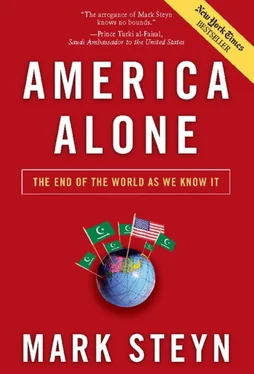Age + Welfare = Disaster for you
Youth + Will = Disaster for whoever gets in your way
By “will,” I mean the metaphorical spine of a culture. Africa, to take another example, also has plenty of young people, but it’s riddled with AIDS and, for the most part, Africans don’t think of themselves as Africans; as we saw in Rwanda, their primary identity is tribal, and most tribes have no global ambitions. Islam, however, has serious global ambitions, and it forms the primal, core identity of most of its adherents in the Middle East, South Asia, and elsewhere. Islam has youth and will, Europe has age and welfare.
We are witnessing the end of the late twentieth-century progressive welfare democracy. Its fiscal bankruptcy is merely a symptom of a more fundamental bankruptcy: its insufficiency as an animating principle for society. The children and grandchildren of those Fascists and Republicans who waged a bitter civil war for the future of Spain now shrug when a bunch of foreigners blow up their capital. Too sedated even to sue for terms, they capitulate instantly. Over on the other side of the equation, the modern multicultural state is too watery a concept to bind huge numbers of immigrants to the land of their nominal citizenship. So they look elsewhere and find the jihad. The Western Muslim’s pan-Islamic identity is merely the first great cause in a world where globalized pathologies are taking the place of old-school nationalism.
For states in demographic decline with ever more lavish social programs, the question is a simple one: Can they get real? Can they grow up before they grow old? If not, then they’ll end their days in societies dominated by people with a very different world view.
FIGHTING VAINLY THE OLD ENNUI
Which brings us to the third factor — the enervated state of the Western world, the sense of civilizational ennui, of nations too mired in cultural relativism to understand what’s at stake. As it happens, that third point is closely related to the first two. To Americans, it doesn’t always seem obvious that there’s any connection between the “war on terror” and the so-called “pocketbook issues” of domestic politics. But there is a correlation between the structural weaknesses of the social-democratic state and the rise of a globalized Islam. The state has gradually annexed all the responsibilities of adulthood-health care, child care, care of the elderly — to the point where it’s effectively severed its citizens from humanity’s primal instincts, not least the survival instinct. In the American context, the federal “deficit” isn’t the problem; it’s the government programs that cause the deficit. These programs would be wrong even if Bill Gates wrote a check to cover them each month. They corrode the citizen’s sense of self-reliance to a potentially fatal degree. Big government is a national security threat: it increases your vulnerability to threats like Islamism, and makes it less likely you’ll be able to summon the will to rebuff it. We should have learned that lesson on September 11, 2001, when big government flopped big-time and the only good news of the day came from the ad hoc citizen militia of Flight 93 .
There were two forces at play in the late twentieth century: in the eastern bloc, the collapse of Communism; in the West, the collapse of confidence. One of the most obvious refutations of Francis Fukuyama’s famous thesis The End of History — written at the victory of liberal pluralist democracy over Soviet Communism — is that the victors didn’t see it as such. Americans — or at least non-Democrat-voting Americans may talk about “winning” the Cold War but the French and the Belgians and the Germans and the Canadians don’t. Very few British do. These are all formal NATO allies — they were, technically, on the winning side against a horrible tyranny few would wish to live under themselves. In Europe, there was an initial moment of euphoria: it was hard not to be moved by the crowds sweeping through the Berlin Wall, especially as so many of them were hot-looking Red babes eager to enjoy a Carlsberg or Stella Artois with even the nerdiest running dog of imperialism. But when the moment faded, pace Fukuyama, there was no sense on the Continent that our Big Idea had beaten their Big Idea. With the best will in the world, it’s hard to credit the citizens of France or Italy as having made any serious contribution to the defeat of Communism. Au contraire, millions of them voted for it, year in, year out. And with the end of the Soviet existential threat, the enervation of the West only accelerated.
In Thomas P. M. Barnett’s book Blueprint for Action , Robert D. Kaplan, a very shrewd observer of global affairs, is quoted referring to the lawless fringes of the map as “Indian territory.” It’s a droll joke but a misleading one. The difference between the old Indian territory and the new is this: no one had to worry about the Sioux riding down Fifth Avenue. Today, with a few hundred bucks on his ATM card, the fellow from the Badlands can be in the heart of the metropolis within hours. Here’s another difference: in the old days, the white man settled the Indian territory. Now the followers of the Badland’s radical imams settle the metropolis. And another difference: technology. In the old days, the Indians had bows and arrows and the cavalry had rifles. In today’s Indian territory, countries that can’t feed their own people have nuclear weapons.
But beyond that, the very phrase “Indian territory” presumes that inevitably these badlands will be brought within the bounds of the ordered world. In fact, a lot of today’s “Indian territory” was relatively ordered a generation or two back — West Africa, Pakistan, Bosnia. Though Eastern Europe and Latin America and parts of Asia are freer now than they were in the seventies, other swathes of the map have spiraled backwards. Which is more likely? That the parts of the world under pressure will turn into post-Communist Poland or post-Communist Yugoslavia? In Europe, the demographic pressures favor the latter. The enemies we face in the future will look a lot like al Qaeda: transnational, globalized, locally franchised, extensively outsourced — but tied together through a powerful identity that leaps frontiers and continents. They won’t be nation states and they’ll have no interest in becoming nation states, though they might use the husks thereof, as they did in Afghanistan and then Somalia. The jihad may be the first, but other transnational deformities will embrace similar techniques. September 10 institutions like the UN and the EU will be unlikely to provide effective responses.
I never thought I’d find myself in the Doom-Mongering section of the bookstore, and, to be fair to myself, there is one significant difference between what you’re about to read and the frostbitten-population explosions-foraging for zinc scenarios above. I’ll come to that difference in a moment, because it’s critical to understanding the central equation in human development: the intersection of demography and will. Demography is mainly a matter of number-crunching, dry statistics. The second phenomenon — will — is a little less concrete, but just as important.
When Osama bin Laden made his observation about people being attracted to the strong horse rather than the weak horse, it was partly a perception issue. You can be, technically, the strong horse — plenty of tanks and bombs and nukes and whatnot — but, if you’re seen as too feeble ever to deploy them, you’ll be kitted out for the weak-horse suit. He wasn’t thinking of Europe, whose reabsorption within the caliphate Islamists see as all but complete. Rather, he was considering the hyperpower. In late September 2001 Maulana Inyadullah was holed up in Peshawar awaiting the call to arms against the Great Satan and offered this pithy soundbite to David Blair of Britain’s Daily Telegraph: “The Americans love Pepsi-Cola, we love death.”
Читать дальше












